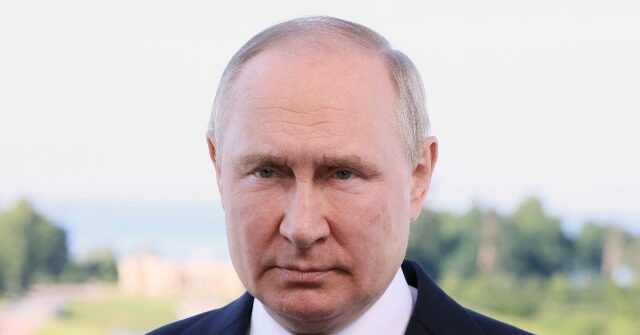Top News
Kremlin Says Vladimir Putin Won’t Attend South Africa Summit Due to Threat of War Crimes Arrest

The awkward drama over if South Africa would fulfill its treaty obligations to the International Criminal Court (ICC) by arresting Russian leader Vladimir Putin during the upcoming BRICS summit in Johannesburg was apparently resolved on Tuesday.
South African President Cyril Ramaphosa declared that arresting Putin would be tantamount to a “declaration of war” against Russia, and that would be “inconsistent” with the South African constitution, but the Kremlin then announced Putin would not attend the BRICS summit anyway.
The Putin dilemma was so difficult for Ramaphosa that South Africa might have backed out of hosting the BRICS summit, passing the duty along to another member, probably China. BRICS is an economic bloc whose members are Brazil, Russia, India, China, and South Africa.
Russian President Vladimir Putin (L) greets South African President Cyril Ramaphosa during the official welcoming ceremony for the heads of state and government of states participating in the 2019 Russia-Africa Summit in Sochi on October 23, 2019. (Photo by SERGEI CHIRIKOV/POOL/AFP via Getty Images)
In late May, South Africa tried to finesse the issue by pre-emptively granting diplomatic immunity to every attendee of the Johannesburg summit in August. The ICC, which counts South Africa as one of its founding participants, signaled this loophole would not be sufficient to relieve Ramaphosa’s government of its responsibility to arrest Putin.
The ICC issued an arrest warrant for Putin and one of his top officials, Maria Alekseyevna Lvova-Belova, in March 2023. The two were charged with the war crime of “unlawful deportation of population” from occupied Ukraine. Lvova-Belova’s agency was in charge of a scheme to kidnap thousands of Ukrainian children and bring them to Russia for indoctrination.
“Russia has made it clear that arresting its sitting president would be a declaration of war. It would be against our Constitution to risk engaging in war with Russia,” Ramaphosa said in an affidavit to a South African court that was filed in June but not made public until Tuesday.
“I have constitutional obligations to protect the national sovereignty, peace and security of the republic and to respect, protect, promote and fulfill the rights of the people of the republic to life, safety and security, among other rights in the Bill of Rights,” he insisted.
Ramaphosa did not explicitly refuse to take action against Putin in his affidavit. Instead, he said his government’s strategy for dealing with Putin had to be kept secret until the last possible moment and chided his opponents for launching a court action before confirming that Putin would visit Johannesburg in person.
“No final decision has been made that he will in fact come to South Africa. As things stand, there is therefore no cognisable legal cause that could ever ground a mandamus to arrest and surrender President Putin,” Ramaphosa said.
Ramaphosa said his Cabinet has “determined that the BRICS Summit will be held in a manner that assures that South Africa abides by its international and legal obligations” but would not commit to arresting Putin if he did show up.
The court said it would proceed with hearings on Friday to determine if a court order requiring Ramaphosa to arrest Putin should be issued.
South Africa’s News24 noted that Ramaphosa filed his affidavit in secret because he “did not want the public to know” he was leaning against fulfilling his ICC treaty obligations.
The court rejected the president’s application to keep the affidavit sealed from the public. Ramaphosa’s office insisted it was “never opposed to making the affidavits public” but tried to keep them confidential because ICC directives required it.
The Kremlin stepped in to take the heat off Ramaphosa on Wednesday by announcing that Putin has decided not to attend the BRICS summit in person but will instead participate by video call. The Russian government described this arrangement as a “mutual agreement” with South Africa.
The opposition Democratic Alliance (DA) celebrated Ramaphosa’s setbacks in court as a “victory,” boasting that “Putin and Ramaphosa have now bent the knee before the DA’s fight for the rule of law.”
“When foreign policy decisions have the capacity to decimate South Africa’s international reputation… and decimate our economy, it is crucial that government uphold its obligation to be open and transparent,” said DA leader John Steenhuisen.
South African Deputy President Paul Mashatile said his government had been trying to persuade Putin to skip the summit for months, without success, until the Kremlin’s sudden change of heart on Wednesday.
Read the full article here


















